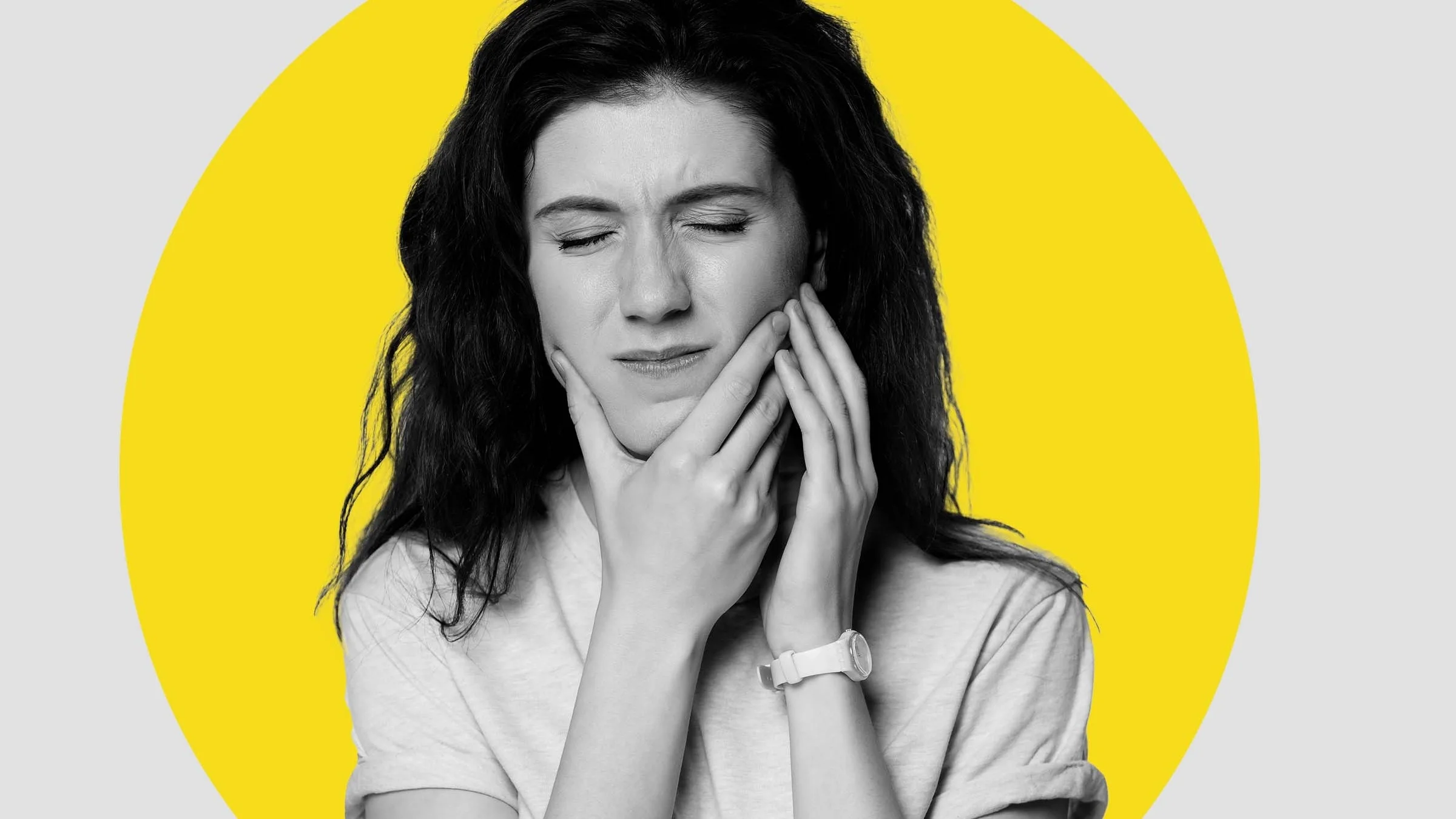Key takeaways:
People grind their teeth (bruxism) for lots of reasons, including stress and side effects from medications.
You may not even realize you’re grinding your teeth, but it can cause long-term problems.
You can often manage teeth grinding with some changes at home, but sometimes you may need mouthguards, therapy, or medication.
Save on related medications
Teeth grinding (bruxism) is when you repetitively clench or grind your teeth. It can happen while you’re awake or asleep, and often people don’t even know they’re doing it. While often harmless, there can be some long-term effects from teeth grinding, such as pain, tooth problems, and disturbed sleep.
When teeth grinding leads to other problems, it’s time to consider treatment, such as mouthguards, behavioral changes, or medication. Let’s take a closer look at what causes teeth grinding and what you can do about it.
What is teeth grinding?
Teeth grinding is repeatedly grinding teeth or clenching the jaw. Some people may have very minor symptoms (or no symptoms at all), while others may have many side effects such as pain or dental complications.
Search and compare options
Bruxism may occur while you are awake during the day (awake bruxism), or you may not even realize you’re doing it while you’re sleeping (sleep bruxism). Awake bruxism is more common, and it occurs in about 20% of people. Sleep bruxism occurs in less than 10% of the population.
What causes teeth grinding?
There are a range of reasons for teeth grinding. And the exact reasons can be hard to figure out. Usually it’s related to:
Stress or anxiety
Sleep disorders such as sleep apnea
Medication side effects, such as antidepressants like fluoxetine (Prozac) or venlafaxine (Effexor)
Substance use (including alcohol and caffeine)
Nutritional factors (such as low levels of vitamin D, magnesium, or calcium)
Do I need treatment for teeth grinding?
Treatment needs will depend on a few factors. For example, you might only grind your teeth from time to time. And it may not cause any symptoms or issues for you. If that’s the case, you don’t need treatment. But treatment can help if you have symptoms or other complications from teeth grinding like facial pain, tooth damage, or sleep disturbance.
There are different types of treatments for teeth grinding. Depending on your specific symptoms, you may be able to treat your teeth grinding at home with behavioral or lifestyle changes (more on this below). If you’re still having issues, the next steps might include a mouthguard or medication. Your dentist or another healthcare professional can help you decide what treatment is best for you.
What if I don’t treat teeth grinding?
If teeth grinding is mild, it may not cause any problems. But sometimes teeth grinding can cause long-term complications. This could include:
Dental problems, including chipped teeth or damaged enamel
Sensitive teeth
Chronic headaches
Ear pain
Jaw pain or temporomandibular joint (TMJ) disorders
Sleep disturbances
Causes of teeth grinding: Teeth grinding has many triggers including stress and certain medications. These are the most common causes you should look for.
Toothache pain can range from mild to severe. Find out what you can do to relieve a toothache fast.
Some things are considered dental emergencies. Here’s when you should go to the ER for your dental pain.
Medications for teeth grinding
If you have a severe case of bruxism, you may need medication to help treat it. There are different medication options, but none are very effective. And like all medications, they have risks and side effects.
Medications you and your care team may consider include:
Some muscle relaxants
Some anxiety medications
Hormone therapy may improve bruxism in people experiencing menopause and sleep disturbance
Botox can paralyze the muscles that cause jaw clenching
Read more like this
Explore these related articles, suggested for readers like you.
How can I stop teeth grinding naturally?
There may be some steps you can take at home to help avoid problems related to grinding your teeth. Here are some natural ways to ease or prevent teeth grinding and its related complications:
Avoid chewing gum. Chewing gum keeps your jaw muscles active and may reinforce clenching habits. Giving your jaw more time to rest during the day could reduce tension and nighttime grinding.
Avoid chewy or hard foods. Tough foods like bagels or popcorn can overwork your jaw muscles. Choosing softer meals helps ease strain and gives sore muscles time to recover.
Try to relax your jaw and face muscles. If you notice your jaw clenching during the day, gently open your mouth or massage your temples. This can help reset your jaw into a more relaxed position.
Work on managing stress. Stress is a major trigger for teeth grinding. Practices like deep breathing, yoga, or even taking short breaks can reduce muscle tension and help you unwind.
See a dentist for routine dental care. Your dentist can check for signs of grinding, recommend a night guard, or offer other strategies to prevent long-term damage.
Have good sleep habits and sleep hygiene. Teeth grinding often happens during sleep, so better sleep hygiene can help. Try to keep a consistent bedtime, avoid screens late at night, and create a quiet, dark sleeping space.
Use a warm compress. Applying a warm towel to your jaw before bed may loosen tight muscles and make nighttime clenching less likely.
Practice good posture. Slouching — especially while sitting at a desk — can throw off jaw alignment. Standing and sitting up straight can reduce tension in your jaw and neck.
Limit alcohol and caffeine. Both alcohol and caffeine can disrupt sleep and make grinding worse. Cutting back on these, especially in the evening, may help improve teeth grinding.
Do oral devices help with teeth grinding?
A dentist can help fit an oral device to protect the upper or lower teeth from damage from teeth grinding. An oral device may not stop the bruxism from happening, but it can help prevent complications. There are different types of oral devices, and most commonly people will use an “occlusive splint,” which is placed over the teeth for protection.
When should I see a doctor or dentist about teeth grinding?
If you’re concerned you may be grinding your teeth, it’s a good idea to discuss this with a healthcare professional or dentist. If your teeth grinding is causing symptoms or beginning to interfere with your life, it’s time to make that appointment to talk about the next steps. If you have underlying anxiety or stress, it’s also a good idea to discuss treatment strategies with your healthcare team — treating underlying anxiety will also help treat bruxism.
Frequently asked questions
Not usually. Teeth grinding is most often linked to stress, sleep disturbances, or certain medications, rather than a specific vitamin or mineral deficiency. That said, low levels of magnesium or calcium have been loosely associated with muscle tension and sleep issues. This may play a role in teeth grinding in some people, but more research is needed to confirm any direct connection.
Teeth grinding by itself isn’t considered a disability. But in severe cases, it can lead to complications like chronic jaw pain, dental damage, or sleep disruption. If it significantly interferes with your daily life, it may be worth discussing with a healthcare professional to explore options for treatment and support.
Some people find that magnesium helps relax muscles and improve sleep, which may reduce grinding. Others try calcium or vitamin B complex supplements, though evidence is limited. Always talk with a healthcare professional before starting supplements, especially if you’re already taking other medications.
Psychotherapy can be helpful when teeth grinding is related to underlying stress or anxiety. You may also consider biofeedback. This can help you learn to control your jaw muscles by getting feedback (visual or sound) when clenching your teeth.
Not usually. Teeth grinding is most often linked to stress, sleep disturbances, or certain medications, rather than a specific vitamin or mineral deficiency. That said, low levels of magnesium or calcium have been loosely associated with muscle tension and sleep issues. This may play a role in teeth grinding in some people, but more research is needed to confirm any direct connection.
Teeth grinding by itself isn’t considered a disability. But in severe cases, it can lead to complications like chronic jaw pain, dental damage, or sleep disruption. If it significantly interferes with your daily life, it may be worth discussing with a healthcare professional to explore options for treatment and support.
Some people find that magnesium helps relax muscles and improve sleep, which may reduce grinding. Others try calcium or vitamin B complex supplements, though evidence is limited. Always talk with a healthcare professional before starting supplements, especially if you’re already taking other medications.
Psychotherapy can be helpful when teeth grinding is related to underlying stress or anxiety. You may also consider biofeedback. This can help you learn to control your jaw muscles by getting feedback (visual or sound) when clenching your teeth.
The bottom line
Teeth grinding is a repetitive and excessive grinding or clenching of the jaw. It can have some negative, long-term consequences that may come as a surprise. It’s important to identify the underlying cause of teeth grinding so that you can effectively treat it. Fortunately, there are a range of treatment options, from lifestyle changes to therapies and medications.

Why trust our experts?



References
Alkhatatbeh, M. J., et al. (2021). Self-reported sleep bruxism is associated with vitamin D deficiency and low dietary calcium intake: A case-control study. BMC Oral Health.
Bertazzo-Silveira, E., et al. (2016). Association between sleep bruxism and alcohol, caffeine, tobacco, and drug abuse: A systematic review. The Journal of the American Dental Association.
Fernández-Núñez, T., et al. (2019). Efficacy of botulinum toxin in the treatment of bruxism: Systematic review. Medicina Oral, Patología Oral y Cirugía Bucal.
Guaita, M., et al. (2016). Current treatments of bruxism. Current Treatment Options in Neurology.
Hachul, H., et al. (2008). Effects of hormone therapy with estrogen and/or progesterone on sleep pattern in postmenopausal women. International Journal of Gynecology and Obstetrics.
Ilovar, S., et al. (2014). Biofeedback for treatment of awake and sleep bruxism in adults: Systematic review protocol. Systematic Reviews.
Khoury, S., et al. (2016). Sleep bruxism-tooth grinding prevalence, characteristics and familial aggregation: A large cross-sectional survey and polysomnographic validation. Sleep.
Lal, S. J., et al. (2024). Bruxism management. StatPearls.
Lavigne, G. J., et al. (2008). Bruxism physiology and pathology: An overview for clinicians. Journal of Oral Rehabilitation.
Lobbezoo, F., et al. (2014). Bruxism and genetics: A review of the literature. Journal of Oral Rehabilitation.
Macedo, C. R., et al. (2014). Pharmacotherapy for sleep bruxism. Cochrane Database of Systematic Reviews.
National Health Services. (2022). Teeth grinding.
Polmann, H., et al. (2019). Association between sleep bruxism and anxiety symptoms in adults: A systematic review. Journal of Oral Rehabilitation.
Shetty, S., et al. (2010). Bruxism: A literature review. Journal of Indian Prosthodontic Society.
Teoh, L., et al. (2019). Drug-induced bruxism. Australian Prescriber.


















